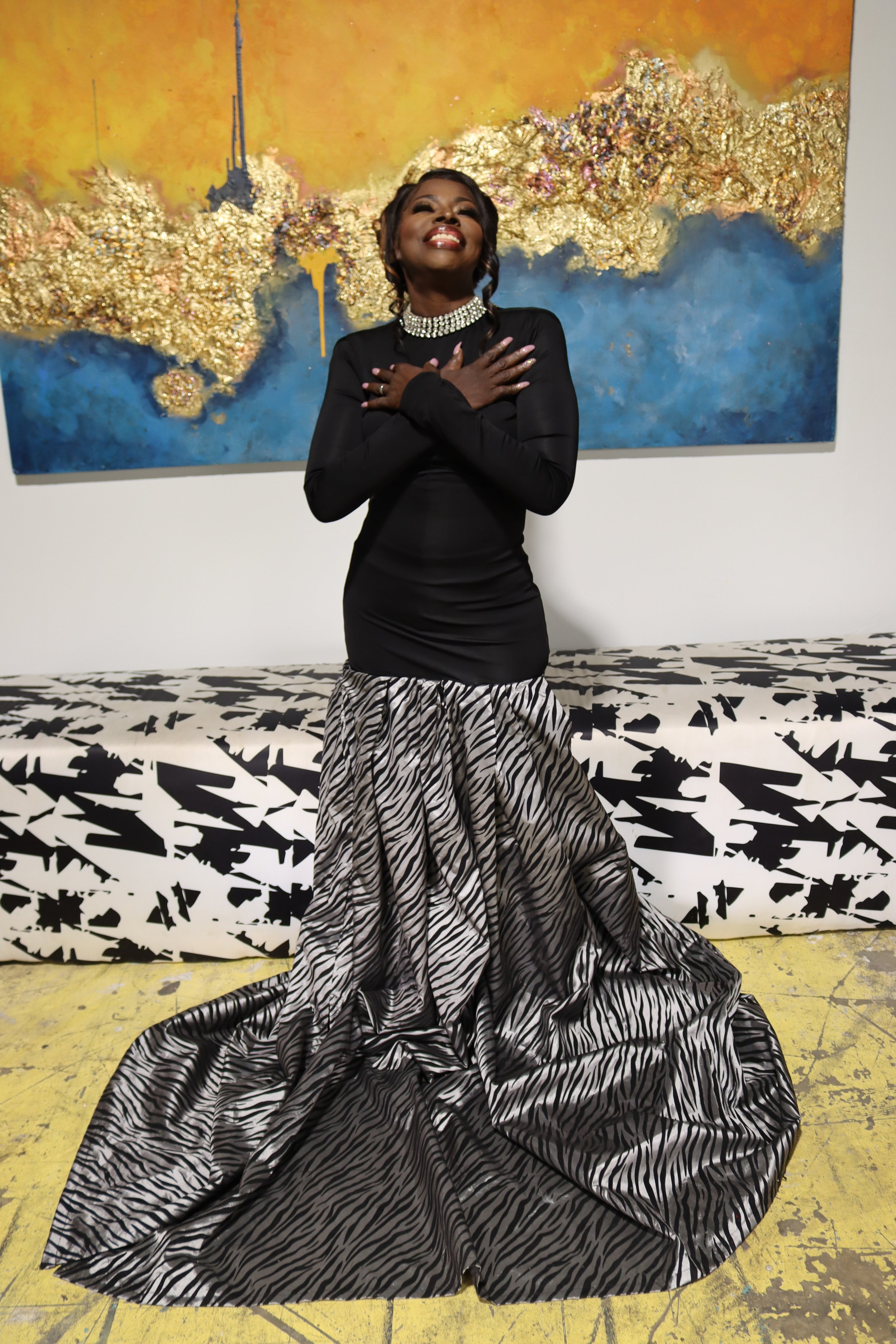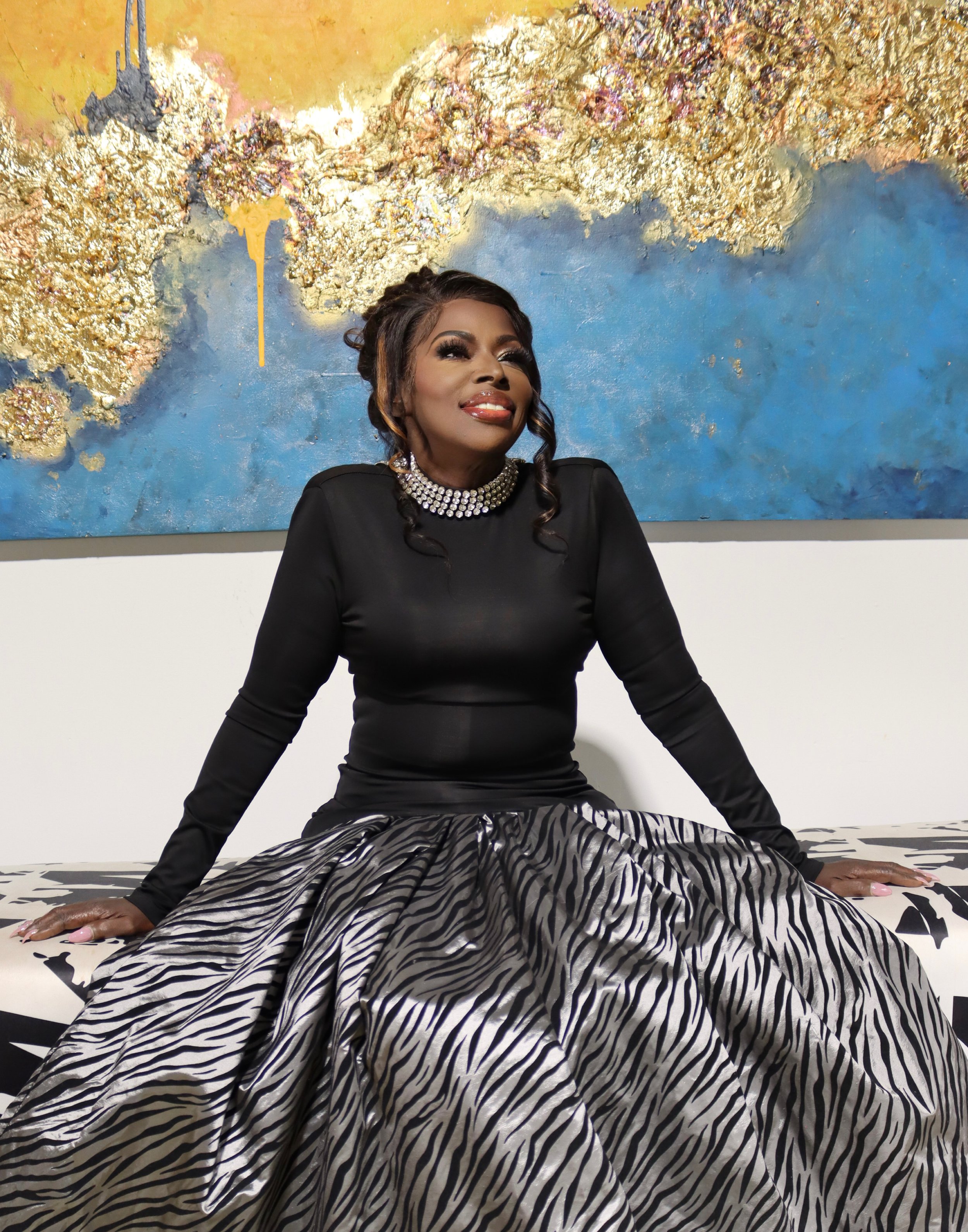Angie Stone (Legendary Songstress) - Spring/Summer 2023 - "Print Issue Available 6/26"
Interview By: Rebecca Edwards Owens
Credits: Photographer/Creative Director @onlymissno | Hair @ayyoimbored_hairbylemar | Makeup @angiegirl79_mua | Dress Designer @omakglobal | PR: @msdivadazz
The Legendary Comeback of Angie Stone
-
The Legendary Comeback of Angie Stone -
An Unforgettable Interview with Legendary Singer Angie Stone: In our latest issue, Fashion Gxd Magazine had the honor of sitting down with the incomparable Angie Stone, a true icon in the world of music. Celebrated for her soulful voice and timeless hits, Stone has left an indelible mark on the industry. As we embarked on this interview, we were captivated by her effortless grace and warmth as she shared stories from her illustrious career. With her signature style, Stone shared insights into her creative process, fierce determination, and the ever-evolving nature of the music industry. Her words flowed with wisdom and authenticity, leaving us inspired and eager to discover what lies ahead for this living legend. Get ready for an unforgettable cover story that will delve deep into the life and artistry of Angie Stone, revealing hidden facets of her remarkable journey and influencing the fashion landscape beyond measure. This issue includes Elexa Love, Rum Island Punch, Savory Bites, NurseIAM, Dj Finesse, Queen Alchemy, LaToya White, Shayle' Simon, Savory Bites, Charismatic Gold, Tai'Co Beauty, and jjlcandleco.
What drew you towards wanting to be a singer/songwriter?
As a young girl, my dad was a quartet singer, so there was a lot of singing going on in my house, a lot of practices by me being an only child, that was a form of entertainment. And after a while of that, it's a learning process for me. When I started school by my mid-sixth, seventh, and eighth grade, I started writing poetry, like liking to do rhymes and stuff.
What kind of poetry? Believe it or not, I would write just about anything because I love experimenting with words. I was a cheerleader, so the one thing I used to always write was I would make up cheers for our cheerleading squad. Some turned out to be award-winning cheers. We won several contests. I would kind of experiment with words and I remember one cheer was called velocity.
How has your sound evolved since your first album? I've grown immensely. You know, in the beginning, I could do a little bit of harmonizing, but because that was a weak area for me, at one point, it became my strongest area because I knew in order to grow, I had to, uh, harmonize. In order to adjust, you have to train your ears differently. So I would always sing the leading note or let the main note be heard and I would harmonize. So I taught myself basically how to hear music and expand my growth as an artist.
What are some techniques you used to expand your rage? I used to use my falsetto a lot to expand my range, I used to have a high C at one time, and, what I would do is see how high I could go, ‘cause I was a fan of Minnie Ripperton back in the day. Now, I have a low-grade voice, so in order for me to hit some of those high notes, I have to go into my falsetto, which is a softer area of the high pitch that I mastered.
How has it been navigating the music industry under different record labels over the course of your career? Well, I went through a few labels only because as time grew and as I got older the model changed in the beginning, you were assigned for five years. The first two 10 years you signed, by the time you've put in 10 years at one label, uh, by the time you go to the next label, they only want to do one or two albums to see how they do and so on and so forth. When I made the transition to do independent records, they were shorter-term label deals, which I preferred doing because I could always, if I didn't like it, I could leave.
How has the music industry changed since you first started out?
Well, you gotta be a lot more careful now in the music industry because there are a lot of things that have happened in the industry, like at the concerts and stuff. So you gotta be extra careful. I just think overall the attention span has definitely changed.
I mean you got about five minutes of exposure or fame before the bottom falls out, so you gotta kind of make the most of five minutes. Back in the day you had at least an hour.
What advice would you give to aspiring artists wanting to get into R&B?
Well, I would just say stay true to your craft, try not to be like anyone. Don't chase the flavor of the month. You have to be an innovator. I would always suggest that you come up with a leadership move so that you can set a standard. I just think whenever you try to copy someone else, that's what you get looked at. A copycat. But if you try to do your own thing, there's a chance that you might just strike at rich.
How do you connect with your fans while touring?
I'm down to earth. I'm a people person, so I connect to them just by making sure to try to answer them, to try to shake their hands, to try to take pictures when I'm feeling okay, I'll do all the things necessary to make them know that I'm just a regular person.
How is the touring experience different now in comparison to earlier in your career? Especially with the different use of technology.
It’s definitely different because iPhones evolved. I mean, back when there were no cameras on phones like that, people had v h s cameras and video cameras of other sorts. But with an iPhone, everybody is a photographer, so the only way you can stop them from doing it is to ban them, and that's almost impossible when you're entertaining thousands of people.
What inspires you in your creative process when writing and singing new music?
Working with a younger artist and not being afraid to trust what the new flavor of the month is and saying to myself, okay, you're older now. Maybe you should listen to your son and your daughter.
I'm not out in the clubs as much anymore, you know, I'm not out there with the young kids. So I listen to them a little bit more.
What is your writing process for your newer singles like “Kiss You” and “Good Man” ?
“Good Man” is a typical Angie Stone song, but I got writing partners that kind of know my style and know where I'm going to go that can help me develop the role or the traction that I need to be on. There's a young lady by the name of Candace I work with a lot, and she is the ultimate songwriter to me. So whenever I have something that I really want done, I can just like poetry, I can tell her the storyboard, put our heads together and say, Candace, this is what I'm trying to say. This is what I'm trying to convey. And we go to work. And that's the process. We build the story together.
There's a song that I have called “Forget About Me” I wrote the song in my head and I called up my manager and I said, okay, here's the scenario. I wanna talk about this. Uh, I wanted to be known that, you know, we were the perfect couple. We did this, we did that. And it seems like somewhere down the line we lost our way with each other.
When we all got our heads together, it's four of us on the phone, we started jotting down scenarios. When it came back, it was like our signal got dropped. What was started was stopped? Like a pass was thrown, they got intercepted. It was everything I said to the T. But now it's like a map you can actually see. It's a collective effort.
How do you adapt your music to new influences while keeping your original style?
It's the producers. I have some great producers. Teak Underdue is a young man that did “Dinosaur,” “Came Back Dead”, “Good Man,” and “Kiss You”. They're all different sounding songs, but knowing the perimeter of your talent, he knows, okay, Angie can do this, this will sound good with Angie. Not only that, “Good Man” is an Angie Stone kind of verbiage. So it feels like Angie Stone, but it appeals to everyone.
For “The Gym,” what went into writing it, and how it ties into the work of a relationship?
“The Gym” is such a great strategic song because it's a metaphor. And a metaphor is something that ties into something that can mean one thing, but it can relate to something else. So the gym was the metaphor of a person who's weighted down, who's overweight, or underweight, tired of, but realizing that, you know, we put so much into this, but at the end of the day, I got to work on my weight. I gotta get all of this off of me and all of this being fat or all of this being stressed. So in this instance, stress was the extra weight, but we implemented weight as the gym because we've gotta work at getting this stuff off.
So that was the approach to trying to get that song completed.
How was it working with Musiq Soulchild again for your new single?
Musiq is a genius. He is, in my opinion, one of the best to do it. I consider myself lucky to have him work with me because he'll work with people, but he has to like it, number one. He has to trust it. And, I can just say that he's comfortable working with me 'cause we did a second song.
And this song was actually a lot of fun because we got to stunt a little bit on our backgrounds and he did his thing. So I'm never surprised. It's always great working with him. He's great.
How do you make time for yourself with your busy career in entertainment?
I don't make a lot of time for myself. I spend a lot of time relaxing because when I do work, I work a lot. So when I do get some downtime, I kind of rest.
What's in store for your new album “Love Language”? How is it different from your last “Full Circle”? What themes are going to be explored?
It’s pretty much, a plethora of nice songs of tempos, mid-tempos, and slow songs. It’s just classic to me. It's a fun album. So I think you'll get, you know, the gist of it once it drops.

By Pilar Scratch in Entrepreneur cover for Fashion Gxd Magazine
32 pages, published 6/26/2023










